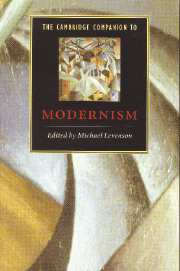Introduction
Published online by Cambridge University Press: 28 May 2006
Summary
Still we call it Modernism, and this despite the anomaly of holding to such a name for an epoch fast receding into the cultural past. Not long after this volume is published, “Modernism” will be the name of a period in the beginning of a previous century, too distant even to serve as a figure for the grandparent. Uneasily but inevitably, we have reached a time when many feel the obsolescence of a movement still absurdly wearing such a brazen title. The temptation, much indulged in recent years, has been to dance beyond the reach of the aging, dying giant, to prove that one can live past the epoch marked by such names as Joyce and Woolf, Pound and Eliot, Eisenstein and Brecht, Freud and Marx. Certainly, many forces have joined to change the vectors of late twentieth-century culture. But our contemporary imperative to declare a new period and to declare ourselves citizens of a liberated postmodernism has badly distorted and sadly simplified the moment it means to surpass.
- Type
- Chapter
- Information
- The Cambridge Companion to Modernism , pp. 1 - 8Publisher: Cambridge University PressPrint publication year: 1999
- 5
- Cited by

